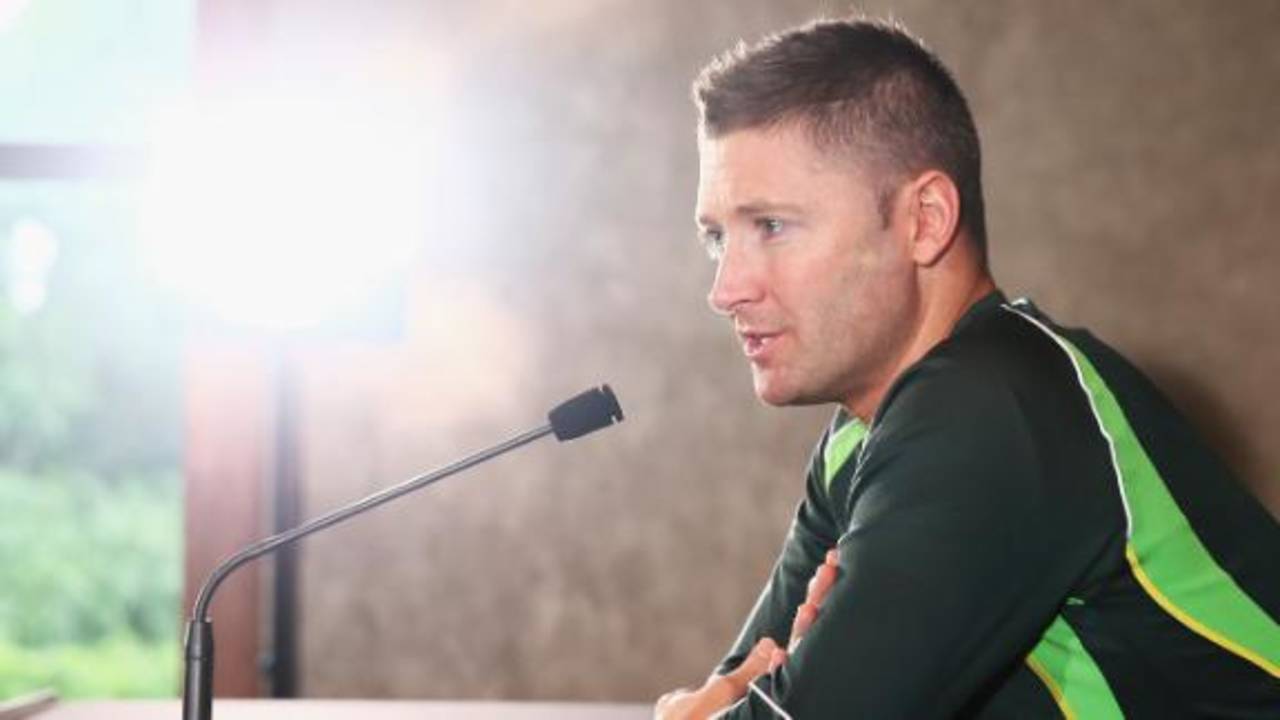On Friday night, John Key and Tony Abbott were due to share a stage with
Brendon McCullum and
Michael Clarke at a pre-match function in Auckland. The Australians might ask their New Zealand counterparts for some advice. A poll this week showed Key was New Zealand's preferred prime minister, daylight second; Abbott barely survived a party-room challenge this month.
McCullum is like a rock star in New Zealand at the moment, universally revered for the way he has brought out the best in his players; Clarke's injury problems and the emergence of Steven Smith as a captaincy alternative have led to leadership speculation. If stable management is the foundation for success, New Zealand have the trans-Tasman edge at the moment, in and out of cricket.
Clarke has played only two ODIs in the past year, McCullum has played 14. On paper, there are currently so few differences between the Australia and New Zealand sides that the leadership stability stands out. But there is a deep mutual respect between the two captains, and McCullum has no doubt Clarke's return for the World Cup clash in Auckland will strengthen Australia.
"Michael Clarke is the leader of the Australian team," McCullum said. "We saw during the tragic circumstances of Phil Hughes' passing how strong a leader he is in the way he carried himself and spoke on behalf of the team. We were certainly in awe of how he was able to carry himself. They are strengthened by his inclusion back in the side."
Such niceties may not fit the narrative of across-the-ditch argy-bargy, stretching back to the underarm delivery, but they reflect the current reality between the players from both sides. When Hughes died in November, New Zealand were playing a Test against Pakistan in Sharjah; the next day's play was abandoned, and the New Zealanders were profoundly affected by the tragedy.
They put out their bats in tribute, wore black armbands, and played in a sombre mood when the match resumed. This is the first meeting of Australia and New Zealand since then, and while much is on the line in a World Cup campaign, Clarke said the respect between the teams was mutual, and the ties only stronger after the events of last year.
"Both teams will compete hard on the field, we always have against each other," Clarke said ahead of Saturday's match. "But I think there's that mutual respect, that we get on really well off the field. I've got a great relationship with Brendon and have played a lot of cricket against him over both our careers. I have the utmost respect for the people of New Zealand, and especially Brendon and his team, in the way they showed that extra respect to Phillip and Phillip's family when he passed."
Such off-field words might not seem to gel with the way the teams play. Australia are renowned on field for their verbal aggression as much as their attacking play, while for the New Zealanders it is all about letting bat and ball do the talking.
"If you look at the Australian team and our team we probably played a similar brand, although the teams go about it slightly differently," McCullum said. "Australia have had a lot of success with that aggressive style of cricket and that's what we are trying to play, be as positive as we can in every situation and endear ourselves to the public with the way we play."
There is no question that the Australians do not always endear themselves to the public with their sledging, or as they often call it, "banter". But Daniel Vettori said this week he could not remember being sledged by an Australian in his 18-year international career, and McCullum had no issue with David Warner's comments that McCullum might be susceptible to "a brain explosion".
"I probably am guilty of brain explosion," McCullum said. "If you play long enough you will make some mental errors. I've read most of the reports and think the Australians have been very complimentary of us. Think there's been some sensationalism, I think they have been very respectful of our team."
For Clarke's part, he wishes the debate would go away. "Sledging, my god, I'm sick of talking about it," he said. But he went on to acknowledge that it was discussed behind closed doors in the Australian camp.
"We talk about it regularly as a team, because we understand and respect the fact that we set a standard for the people watching at home, young boys and girls who want to play cricket, that example is really important," Clarke said. "But I certainly wouldn't expect Australia and New Zealand to walk on that field tomorrow and be best of mates on the park."
Whatever the relations between the sides at Eden Park on Saturday, there is plenty at stake. New Zealand have won three from three in this World Cup campaign and one more win is enough to secure a quarter-final place. Australia have played just one game in a fortnight, and need to feel bat on ball again after their washout against Bangladesh last weekend in Brisbane.
New Zealand trained on Friday morning in perfect conditions, but when the Australians arrived around lunchtime, so did the rain. It bucketed down, precisely what they didn't want to see. Fortunately for Clarke and his men, the downpour was only temporary, the sun came out and a training session was possible.
"I don't think it's made any difference," Clarke said of Australia's lack of cricket. "The boys have had a long summer, we've played a lot of cricket, everybody is ready to play. We were ready to play against Bangladesh, that got washed out, we are ready to play here. If this game was to get washed out we will be ready for the game in Perth [against Afghanistan]."
Brydon Coverdale is an assistant editor at ESPNcricinfo. @brydoncoverdale
